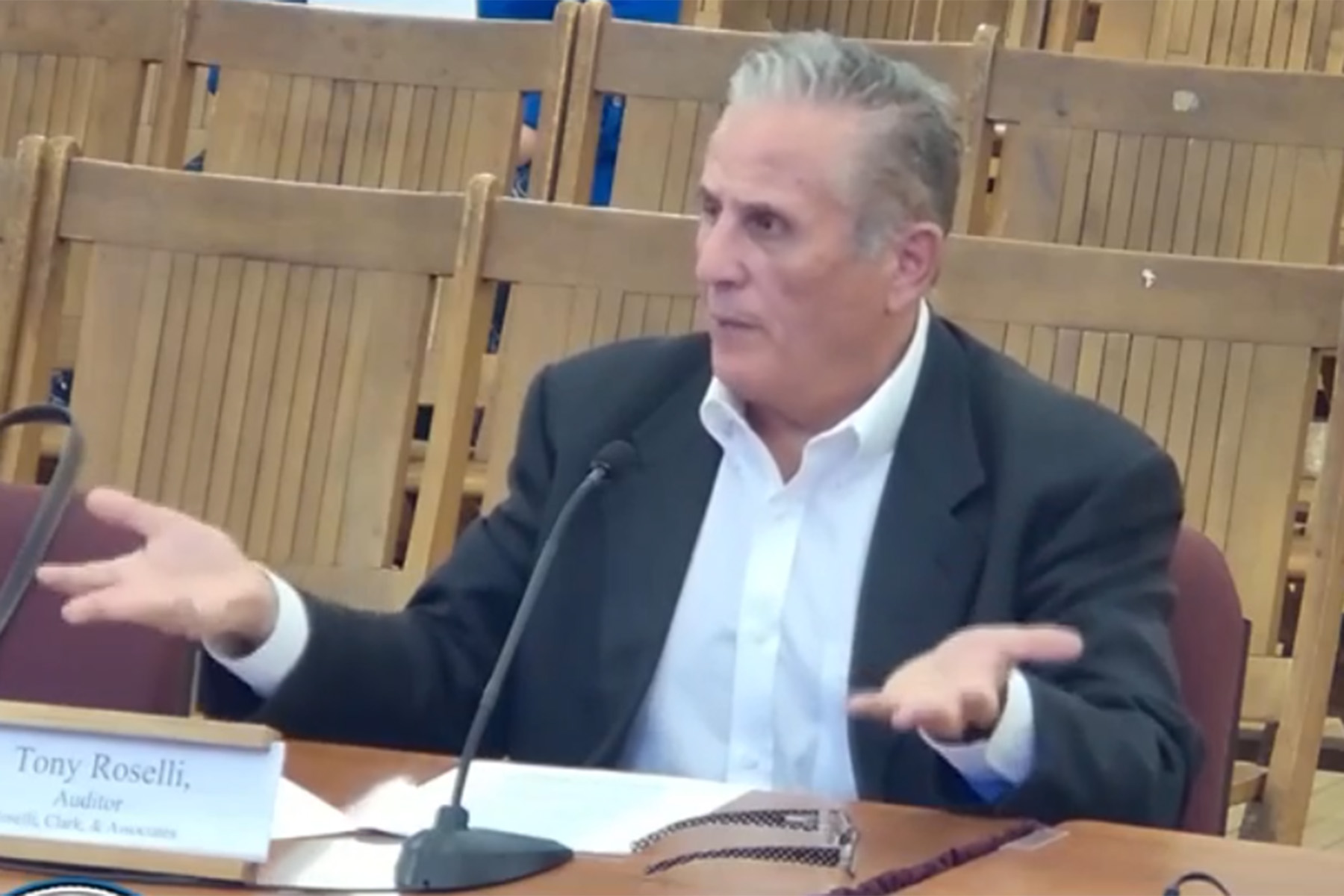

This Week's Winchendon News
Town Auditor Report to Tri-Board Meeting Finds Errors in the Town's Favor

Auditor Tony Roselli addresses the Board of Selectmen, Finance Committee and School Committee
Photo copyright Town of Winchendon
On Monday, October 6, the Tri-Board Meeting of the Board of Selectmen, Finance Committee and School Committee convened to hear the annual audit report from auditor Tony Roselli of Roselli, Clark & Associates, which has done Winchendon's annual financial audit for the last 15 years or so. This year's report included some surprises. It appears that Winchendon has not been diligent in keeping track of, and going after, funds that it does have or should be collecting. The resulting gap potentially is around $4 million for the town, although Mr. Roselli emphasized that it's not as though $4 million was just sitting out there. Much of this, for example, consists of uncollected taxes which are delinquent for many different reasons.
Mr. Roselli told the Boards that the report doesn't impact the town's bond rating, but it does go to the state, and some parts of the report go to the federal government. Mostly, he said, "It's more of an internal report for you folks to read it and basically use it as an educational tool to improve the town."
Mr. Roselli began with what he explained are "informational items" or observations in the report. In order of severity, these are controlled deficiency, significant deficiency and material weakness. Fraud prevention was a top concern for him. "What I'd like to see in this town, which we haven't seen in a while, is just a check and balance back to the departments," he said. "So either the Town Accountant or the Treasurer should have a process in place where when receipts are turned over for a quarter, you should be able to tally that up for the quarter, go back to the department and see what sort of records they have--reconcile that back and see what type of procedures they have in place. Also, for the Treasurer's office, the Treasurer should be going back to those departments to see how they store their cash before they turn it in. The checks and cash, is it in a drawer? Is it in a safe? Where is it and how often do they turn it in? So these are just simple procedures that should be done throughout the year by the Treasurer and the Town Accountant. With all the turnover and all the other problems that have been happening in this town, I don't see that process being done enough, so that's something I would definitely like to see the town implement as an internal control."
Mr. Roselli then moved on to the Treasurer-Collector and Town Accountant's offices. He found a large variance--"large" meaning around $450,000--due to accounts not being reconciled. It's a "positive variance," meaning it's in the town's favor.
To explain this, he began, "In the Treasurer's office, we have to tell a story. So, you had Donna, who was here for a long time. She was an Assistant Treasurer, became the Treasurer around 2012 or 2013, held that position for a while, went through a learning process herself similar to what's going on here, and really got the ship straightened out, so that when we came in to look at her records, they were balanced. They were correct. Everything was being done the way it should be.
"She retired in 2021 and that's when you started hiring. There was a basically a revolving door in the Treasurer's Office, and this is when the problems began. So we found if you go back to private management letters, you'll see that bank reconciliations were not being done, and if they were being done, they were inaccurate. This goes all the way back to FY 2021-22. It got pretty severe in '22 and '23 and it's still a problem in FY24."
He compared it to an individual person's checking account. Every month when the bank statement comes in (or is made available online), a customer needs to reconcile their own checkbook or accounting records with the bank's record. This shows how much money is actually in the account, where checks haven't cleared and are still outstanding, and so on. The town needs to be doing exactly the same thing, every month, and it wasn't being consistently done--for several years.
In September 2023, the town re-hired Donna. Mr. Roselli went on, "So Donna, the old treasurer, came back, the one that had been doing these bank reconciliations correctly, in September and basically started a process of doing the entire year. In fact, she went back to FY22, so she did FY22 and FY23 and FY24, she rolled it all the way up.
"Then Eric Kinsherf, who's been around the town for about 12 years, he's an accounting specialist that does municipal accounts, he came in to help out the accounting side and at the same time, looked at the Treasurer side to see if that makes sense. So what ended up happening at the end of this process is we still have a reconciling variance of about $450,000 in the bank, reconciliations in the Treasurer's office that has yet to be resolved. I don't know where they're at in FY25, I don't know if they've started to look at that yet, but at the end of FY24 it's out $450,000. The good news is it's a positive variance. It's not low, it's high, which tells me that receipts were missed."
School Committee member Karen Kast asked how all that could have been missed, and is the new Treasurer caught up with everything?
Mr. Roselli said, "It started with two Treasurers ago, people thinking the bank reconciliation were getting done. When I came in to do the audit and sat down and asked for the bank reconciliations, I got handed a bunch of documents, but there was a pile of documents where the envelopes weren't even opened for 12 months. So I said, 'When was the last time anybody even looked at this particular account?' And it's the most complicated account, with a lot of things happening to it, and and this is before [Town Manager Bill McKinney]'s time. This is two years ago. This when all the problems started. So I volunteered, 'Let me open these and see what's in here, see if I can make heads or tails out of them.'" That began a process that started with a discrepancy of millions, got down to $250K, Donna stepped in to work on it, and now the variance is at $450K. "This didn't happen in one day. This was just an accumulation of just not doing this. And so even though they caught up, you'd have to redo everything. You'd have to redo every transaction to really find out where these problems are," he said.
Ms. Kast noted that Mr. Roselli had made a number of recommendations last year that weren't followed, including that the town hire a consulting firm to handle all of this.
Mr. Roselli said, "I thought I'd made some good recommendations. I even found two individuals that were willing to come here--superstars, the best in the field, were willing to come here. And when they called me and said that no one had reached out to them, I said, 'Okay, well, it's out of my hands.'"
School Committee member Greg Vine asked Mr. Roselli to clarify his statement about the accounts being "off by $450,000," saying, "that's a pretty nebulous statement."
It's cumulative, Mr. Roselli said. "If I go back to FY22 they're off by about $90K or $100,000, you go to FY23 and they're off about $250K and you go to FY24 and there are $450K, so it's gotten increasingly larger." He went on, "I found some of the problems were that now the state will wire you the money. They don't send you a check, so if you don't open the envelope, you don't know if you got that wire in. So reporting that to the Town Accountant isn't going to happen if you don't know yourself that it's happening. It happened with some of the school grants, because the superintendent before you was saying, 'Why do I have all these deficits?' And when I looked into it, it was because the wires had not been applied. Someone thought, the town's taking those grants...that wasn't the case. It was just that the grants were not being reported as they were coming in."
Mr. Roselli said he guessed that there were a lot of small amounts that weren't being properly recorded as the state dropped the money into the town's bank account. If three payments are being missed every month, in a year there will be 36 payments in the bank but not recorded in the town's ledgers.
There was some discussion about the role the online accounting software systems may have played in creating this situation. Mr. McKinney had explained to the Boards and the public in the past the problems involved with two different software packages being used, requiring data to be ported over manually rather then everything updating automatically. Mr. McKinney said, "Per the auditor's recommendation from last year, I got a grant from the state to be able to move from QDS to Munis, and we're in the midst of doing that conversion right now."
School Committee Chair Mike Barbaro recalled that in 2015, "We had a problem. Someone made a change without telling anybody, and it gummed up the works, in my not so humble opinion. It made it difficult for [Mr. McKinney] to come in or anybody to understand what had gone on."
Mr. Roselli said, "You were running this very expensive system, but you needed an Excel workaround to run it, because the town was on version 2, but Munis was on version 14, so it just wasn't working right. So Charlotte created this Excel workaround, but when Charlotte left, nobody knew how to do that. I remember that and that did hurt you for a few years, till you got it straightened out." Just last year, he said, no one could figure out how to run reports out of the system that he asked for.
Another observation Mr. Roselli had involved "tailings." These are checks issued by the town that are never cashed by the recipients and never clear the bank. The town can run an advertisement to alert people to the fact that these checks are floating around out there, and the recipients can come in and request a replacement. Usually they don't. After 12 months, the town can claim those funds as income. "And there's a lot here, because it hasn't been done in at least eight or nine years," Mr. Roselli said. "There's a lot sitting there, and a lot of it's going to be in that vendor account that you're closing now" to let the account clear out. Mr. McKinney said that Donna had gone through the tailings a few months ago this year. (The Courier published the notice.)
Mr. Roselli said that when the tailings were done ten years ago, $54,000 of them were never brought into income--it just got left on the general ledger. That can be added to Free Cash. "At the end of this process, what you're paying to get this done is worth it, because you're freeing up probably $500,000 or $600,000. So it's good to spend the money [to take care of it]."
Moving to the Town Accountant's office, Mr. Roselli said that a big factor there is that the Accountant can't work accurately without knowing the correct cash balance. "So part of the Accountant's problems is the Treasurer not reconciling the receivable balances with the Collector. And the other thing that's very important is the school grants reconciling with the school business officer. That obviously didn't happen as well, and the balance sheets got turned in many months late."
Continuing through the report, Mr. Roselli went on, "There's a bunch of Town Meeting votes that never got recorded, so those all do need to be recorded in fiscal 2025. So it's fortunate you didn't do your Free Cash because you had all these things missing, so it would have been an incorrect figure."
He went on, "The last couple years I've talked about outstanding receivables piling up. Anyone who runs a business, if you can't collect your receivables, you're not going to be in business long. Same thing applies to towns. The receivable balances were accumulating. I looked and found that the liens hadn't been done since Donna did them last back in FY21, so that's way too long to go without doing liens. People out there start to understand that the lien process doesn't happen, so they start to game the system, which makes it worse."
The demands have been sent out through the end of FY 2025, but the liens haven't been done for about four years, according to Mr. McKinney, who affirmed that the town will need the help of an attorney to get that process done. "That's important that that gets done," Mr. Roselli said. "Most folks will pay once they get the demand, but some of them will wait to be liened before they pay, and you definitely don't want that balance getting much bigger."
That would be bigger than $2.6 million, the current receivable balance stated in the report. $1.4 million of that is in tax title now.
Mr. Roselli said that a lot of towns are bringing in companies that will take over a property in tax title, buy it from the town and then the company deals with the property owners. They keep the interest and make money with the process, and it's all taken off the town's shoulders. "They're not going to treat the taxpayers as well as you folks will...It's a desperation move," he said.
After quickly going through OPEB, compensated absence, and FEMA monies with glitches to be cleared up, Mr. Roselli came to "stagnant balances." These are funds that came in from one-off sources--"gifts" or donations, grants--that were never spent and are just sitting there. "Folks will give gifts to the Police, Fire, Public Works, Council on Aging. They go into a gift account, and you can spend it on things that are outside the budget, that are related to the department, or it could be a specific gift. Someone says, 'Hey, I'm going to give you this gift, but you got to do that project.' So what's happening is, because of the turnover in the town, these gifts that have accumulated in the departments, the department heads don't know about them. So someone should be sitting down with the department heads and say, Hey, you got these gifts. Or a revolving fund could have been set up. Someone could have created a revolving fund in 2017 that doesn't exist anymore, but you accumulated money in that revolving fund. Some grants that never got spent down to zero could still be possibly used, even that are sent back to the state."
Mr. Roselli said he identified $730,000 sitting in these various special revenue accounts. Each account has to be looked at individually to see how it can be used. The accounts do not earn interest.
Mr. Roselli also said that there is "about a half million dollars" left in 15 capital projects that could be reimbursed. That money could be used by departments, appropriated or used to pay debts.
Mr. Barbaro put in that according to his calculations, the town may have up to $4 million in funds it hasn't recorded or could collect--$450K from account reconciliation, $730K from special revenue accounts, $500K from capital projects, and $2.6 million from tax title revenue, although as Mr. Roselli said, "you can make an attempt to go get that, right."
All of these amounts are conditional and have circumstances unique to each one, so bringing them into the budget will be neither simple nor always certain. Ms. Kast expressed concern about citizens accusing the town of hiding funds while it asked for an override. Mr. Roselli said, "No, you're not hiding anything. The $2.6 million...the town always has a receivable balance. So you're not just going to collect that $2.6 million, it's just not going to happen. There's always the new ones are going to create a balance. So the $2.6 million, if you put good efforts towards it, maybe a million of that comes in quickly. The rest is kind of a staggered process."
He went on, "The tax title process takes a while. It's not something that you just wake up and say, I'm doing tax titles today. It's a process you're probably going to need legal help to get it done, because some of them are probably tricky and and and then some people decide not to pay you, and you're gonna have to take them into tax court and tax foreclosure. But this [outstanding balance] is unusually high.
"So there is the ability to recoup some of that pretty quickly, just from the fear that the town is doing that. If I'm sitting back at home with three years outstanding taxes and I'm watching this, I'm like, maybe I should pay my taxes before something happens. So don't underestimate the fear of doing that. Even if you say we're thinking about going to hire, let's have this guy come in and talk to us, some of these attorneys. And just knowing that that's going to happen, that you're talking to people, creates fear.
"To me, it's not fair. This is where I get a little emotional. The rest of the taxpayers, 99 percent of the taxpayers in this town pay and 1 percent are off the hook. So do something. Just do it and and be responsible."
Mr. Vine said, "Can you, or [Mr. McKinney], or both of you, give us something positive moving forward? Because just to look at this report and have people listen to it at home, it's basically, what it's saying to the taxpayers, is that we haven't done such a great job keeping track of your money."
"You haven't," Mr. Roselli said. "Let's not hide that you haven't done a good job." But he said, right now the town has some extremely good people working on their finances. The schools have "a great school business manager." The FY 2025 books should be closed in November. A lot of decisions will still need to be made about to handle the variances and reconcile everything going forward. Some problems may originate so far back, tracing them would take too much time, and it might be better to just "make a clean slate."
The Boards discussed how to get the town back on track and keep this from happening. Mr. Roselli said that three years ago, he had pointed out to the Boards that "Everybody's retiring" and this was going to be an issue. "I said as quickly as that got built up and you got rid of that deficit, that $3.6 million deficit...it was a ten-year note and you guys had it paid off in four years. You know, great management, great processes in place. The departments were all working well together. And I said, as quickly as you built that up, if you don't replace the people that are retiring with qualified people, it's going to fall so much faster."
The Boards discussed the shrinking pool of qualified people who want to work in municipal positions. Towns can only afford to offer so much. Training people who can step into higher positions, and having backup people for vacations and so on would be good. Some towns now are sharing an Accountant, who works one or two days a week in each town, Mr. Roselli said. In the near future, municipalities may have financial staff who work remotely.
Board of Selectmen Chair Andrew Beauvais asked, "I wanted your take compared to what you saw last year, what you just went over with us this evening, and the forward momentum, the things that we're working towards. Are we on the right track right now?"
"Yes," Mr. Roselli said. "Last year, there was no plan. This year, there's a plan...Everyone seems to be motivated to keep the ship moving forward. The school is not an anchor...so yes, I see it going in a positive direction. It's much better than last year."


